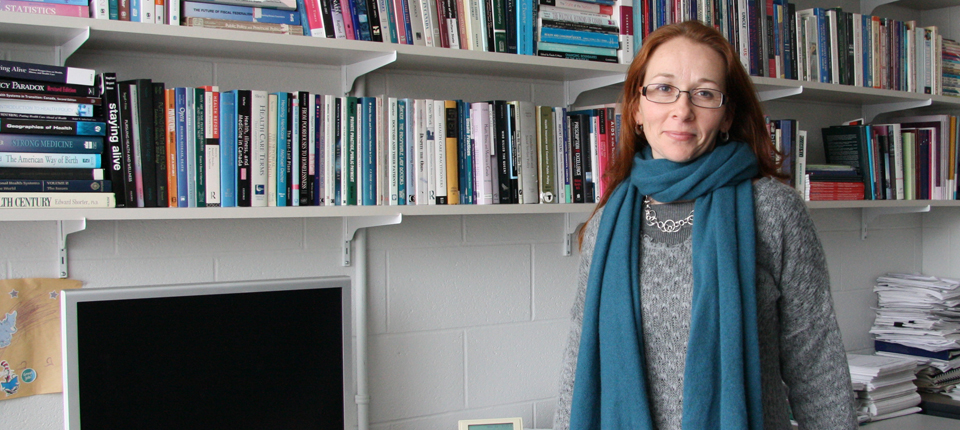How can we improve the health and wellbeing of older adults and their caregivers in different contexts?
Tamara Daly leads a research program that explores how to improve the health and wellbeing of older adults and their caregivers in a variety of contexts, with a focus on long-term care. Daly uses innovative mixed methods approaches to examine conditions in long-term care facilities in Canada and in other countries. She carries out much of her research “in the field,” working alongside caregivers and in collaboration with care facilities, unions, and policy makers to deliver findings that address current policy debates and improve real world healthcare environments.
Inspiration
For me, it’s important to think not only about people who receive care, but also those who provide it. In Canada and elsewhere, a lot of healthcare work is highly gendered. Caregivers, who are often women, frequently face lower pay and more precarious working conditions. There is also a lot of informal care provided, but this is seldom recognized. When formal care is limited due to resource constraints there is increased pressure on families, students, and volunteers – and particularly on women—to fill the gap.
I believe that it is crucial to address the needs of vulnerable and marginalized groups. Unfortunately, residential care seems to be a place where we tend to forget about people. This needs to change, and for this policy change is essential
Impact
My “aha!” moments have come when I’ve used a combination of different research methods to better understand complex social problems in different contexts.
When our research findings are relevant to policy-making processes, we develop a plain-language report. We prepare this in a format that workers, unions, and policymakers can easily access, and we connect our findings to recent developments and policy concerns. We circulate our report and hold a press conference to draw attention to the issues at hand. I believe it is vital to link our research to the real world and to share our findings publicly in order to provide a basis for positive change.
Highlight
I recently completed field research for a successful long term care project that I led with Canadian researchers Pat Armstrong (a sociologist) and Karen Messing (an ergonomist). Together with our students we used ethnographic methods, including systematic observations that we recorded in detail, to investigate healthcare work in long-term care facilities. We wanted to understand how informal care occurs alongside formal care, and to find a way to capture the flow of activity in facilities. We carefully mapped out dining room spaces and how people moved within them. In this way, we were able to show how even small changes, such as someone calling in sick or a family member not showing up, created huge disruptions in the rhythm and flow within dining spaces. Our research revealed how heavily long-term care facilities depend on informal care, exposing a significant care gap. We often say that long-term care is underfunded and understaffed, but this research provided evidence by documenting the “invisible care” that the existing system depends on.
What’s next?
Intervention research is becoming an increasingly important part of my research program, as is a focus on raising awareness about key health issues facing older adults in diverse communities. Intervention studies involve instituting a change, and then investigating the impact of that change under particular conditions. This can yield powerful lessons about how best to promote health and wellbeing in specific contexts. In addition to my research on long term care, I lead the local arm of a collaborative project that promotes cardiovascular health awareness for older adults through a community-based, volunteer-run initiative. We are currently investigating how to adapt the Cardiovascular Health Awareness Program (CHAP) for the needs of South Asian communities in the Greater Toronto Area. These different areas of research are linked by my concern with developing equitable, accessible ways to advance health and wellbeing.


